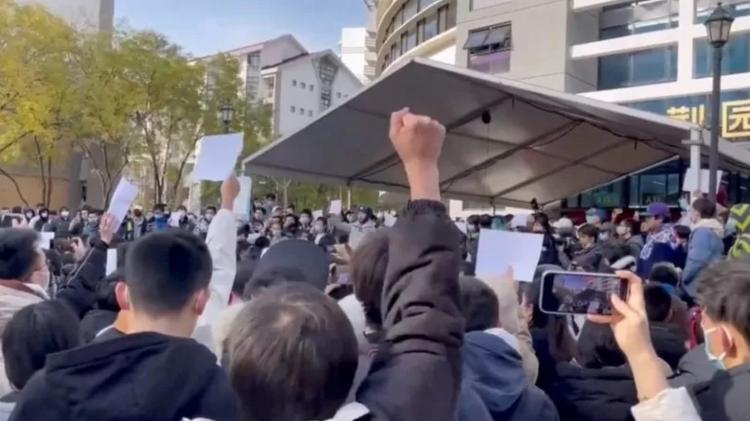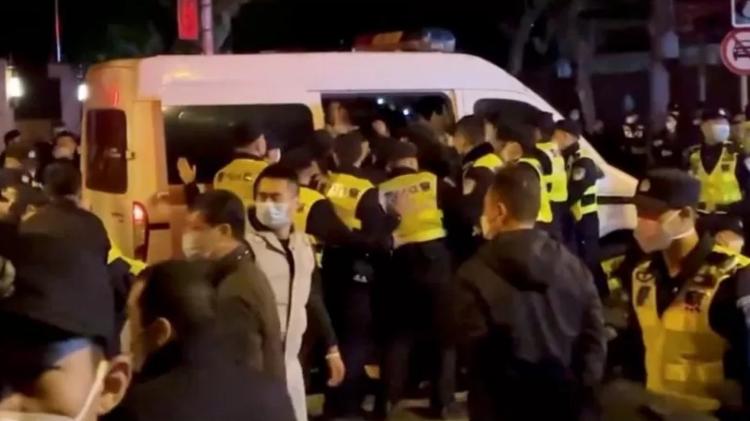A new generation took to the streets this past weekend in China. Many were joining their first protest.
They demonstrated against the zero covid policy implemented in the country for almost three years.
Demonstrators in Shanghai initially remained silent when they gathered to pay their respects to the victims of an apartment fire in western Xinjiang. Many believed that the Covid-19 measures prevented residents from escaping the flames.
They held up blank papers in protest, laid flowers on the scene, and remained silent, under heavy police surveillance. But then some started chanting: “Freedom! We want freedom! End the isolation!”
As the night progressed, the crowd grew larger and more daring. At 03:00 local time (4:00 pm on Saturday, 11:00 am local time) on Sunday, 27/11, they shouted: “Xi Jinping, give up! Xi Jinping, give up!”
One participant in his early twenties said he ran into the street after hearing the crowd coming from his room. “I’ve seen a lot of angry people online, but no one took to the streets to protest,” she told the BBC.
He took his camera to record what he saw as historical events. “A lot of people are here – police, students, seniors, foreigners. They have different opinions, but at least they can express themselves. It’s meaningful for them to gather here. I believe it will be a meaningful memory for me.”
A young woman close to the crowd said she found the moment moving but fragile. “I’ve never seen anything like it in my life in China. I’m relieved. We can finally get together and talk about something we’ve wanted to talk about for a long time.”
For him, the zero covid policy stole the best years of their lives. His generation had lost income and livelihoods, education and travel opportunities. Sometimes they were imprisoned for months, separated from their families, delayed or canceled plans and projects. They were “angry, sad, helpless”.
Similar statements were heard in many major cities of the country that weekend. Students at Tsinghua University in Beijing, inspired by the protests they saw online, also marched.
A video that went viral showed a young woman speaking quickly into a loudspeaker in fear. Her voice cracked as she cried, but the crowd shouted, “Don’t be afraid!” she insisted.
“I think people will be disappointed with us if we don’t raise our voices for fear of losing credibility,” he said hoarsely. “As a student at Tsinghua University, I regret it forever.”
Smart or naive?
Political demonstrations, unseen in decades, have sparked memories for older Chinese of the 1989 Tiananmen Square protests, again led by students calling for greater freedom in China.
But some say this generation’s enthusiasm stems from their ignorance of the outcome of these protests – bloody repression.
“The combination of youth idealism—fearlessness without the burden of painful memory—forces young people to take to the streets to claim their rights,” says Yaqiu Wang, a researcher at Human Rights Watch in China.
Others claim that it blurs the view of the protesters. Wen-ti Sung, a political scientist at the Australian National University, says it doesn’t allow their youth to realize how fit they are with the Chinese system and rules.
He marvels at the “tactical intelligence” of the protesters. Today’s young protesters are “the most educated generation China has ever seen,” he says.
“They know the limits. They test them without breaking them,” he adds.
Protesters in Shanghai have called for Xi’s dismissal. However, at nearly every rally, demonstrators silenced demands they feared were too political.
Blank papers with nothing on them became symbols. When instructed by the police to stop calls for an end to the zero covid policy, they sarcastically responded, calling for more testing and more restrictions.
“Just look at the care the Chinese government takes to avoid and minimize the accusations they may bring against them,” Sung says.
Protesters also paid attention to voices that deflected their messages.
When a man in Beijing warned of “external influences,” he said, “By foreign influence, do you mean Marx and Engels? Stalin? Lenin?” The Chinese Communist Party cites Marxism as its guiding ideology.
The Beijing crowd insisted: “Was it foreign powers that set the fire in Xinjiang? Was it foreign powers that overturned the bus in Guizhou?”
A man asked the crowd, “Did foreign powers bring everyone here tonight?” he shouted, and then angrily, “No!”
‘Liberal nationalists’
Before the pandemic, young Chinese were content with their future prospects. Covid-19 changed that with the introduction of restrictions and their impact on the economy.
“I can’t travel the world, I can’t see my family,” said the young man in Shanghai with a camera. She told the BBC she was afraid for her cancer-stricken mother, who lives in the southern city of Guangzhou.
City officials lifted Covid-19 restrictions in most counties Wednesday (11/30).
“I really want to see him. I haven’t seen him in a long time, I haven’t touched his face, I haven’t had dinner with him,” she said. “I hope this lockdown policy is relaxed as soon as possible.” He was taken into police custody later that day.
Many people who have spoken to the BBC or seen talking in videos online say they want to see their country progress. In the protests, the crowds repeatedly sang China’s national anthem, especially the verse calling on people to defend their country.
One thing that sets this generation apart, Sung says, is their fierce patriotism that grew during China’s rise to the world stage. Because they believe so much in the system, it labels many of those who blame it when something fails as “liberal nationalists”.
“Sensitivity can go from pro-government to anti-system very quickly,” he notes. But there is a collective desire to prove that their protest is legitimate and on the right side of the law.
In the video at the Tsinghua campus, after the speaker voiced concerns that the protest might be hijacked by troublemakers, the crowd said, “No lawbreakers here! No lawbreakers here!”
Then a man’s voice was heard in a worried tone: “If we lose control of this, we will be defeated”. “We don’t have experience in doing that… But we’ll learn little by little.”
This text was published at https://www.bbc.com/portuguese/internacional-63748080.
source: Noticias
Mark Jones is a world traveler and journalist for News Rebeat. With a curious mind and a love of adventure, Mark brings a unique perspective to the latest global events and provides in-depth and thought-provoking coverage of the world at large.

